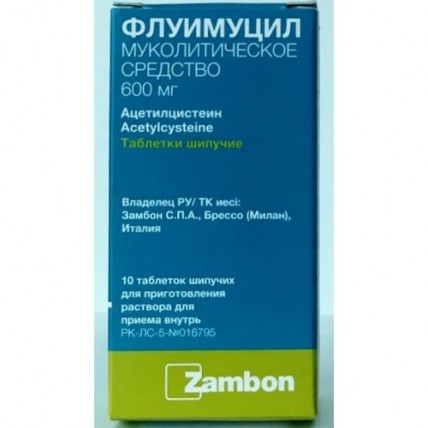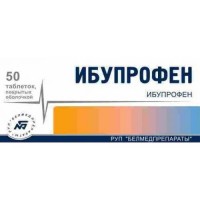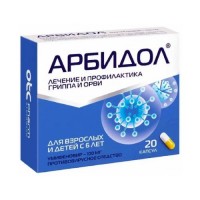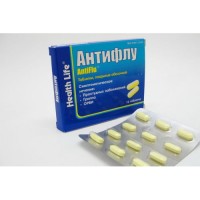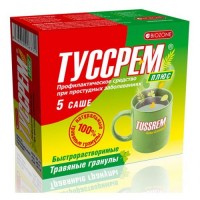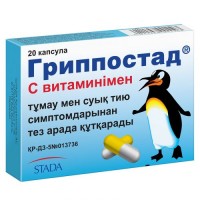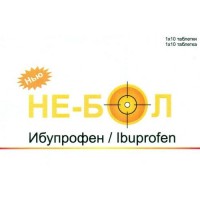Fluimucil 10s 600 mg effervescent tablets
- $21.00
Pharmacological action
Mucolytic drug. Dilutes a phlegm and facilitates its discharge. Effect of Acetylcysteinum is connected with ability of its sulfhydryl groups to break disulfide bridges of acid mucopolysaccharides of a phlegm that leads to depolarization of mukoproteid and reduction of viscosity of slime. Keeps activity in the presence of a purulent phlegm. Fluimucil has abhesive properties, has the antioxidant effect caused by existence of nucleophilic thiol SH group which easily gives hydrogen, neutralizing oxidizing radicals. Acetylcysteinum easily gets in a cell, is deacetylated to L-cysteine from which the intracellular glutathione which is the antioxidant and a cytoprotector neutralizing endogenous and exogenous free radicals and toxins is synthesized. Thus, Acetylcysteinum warns exhaustion and promotes increase in synthesis of intracellular glutathione, promoting a detoxication of hazardous substances. Effect of Acetylcysteinum as antidote in poisoning with paracetamol is explained by it. At use of drug the reduction of frequency and weight of aggravations at patients with chronic bronchitis and a mucoviscidosis is noted. In the research BRONCUS (Bronchitis Randomised On NAC Cost Utility Study) the influence of long therapy was studied by Fluimucil in the chronic obstructive pulmonary disease (COPD) of an average and heavy stage. Fluimucil is capable to reduce the frequency of aggravations of HOBL and a pulmonary hyperinflation. Its positive effects are especially significant at a heavy stage of HOBL.
The indications
of the Disease of respiratory organs which are followed by formation of a phlegm of the increased viscosity including: – acute and chronic bronchitis, – tracheitis, – a bronchiolitis, – atelectases owing to bronchial obstruction slime, – pneumonia, – a bronchoectatic disease, – a mucoviscidosis, – bronchial asthma, – for removal of a viscous secret from airways at posttraumatic and postoperative states, – for simplification of an otkhozhdeniye of slime in sinusitis.
The dosing mode
Drug in the form of tablets sparkling is appointed the adult on 600 mg (1 tab.) 1 times/days. Before use the sparkling tablet is dissolved in 1/3 glasses of water. Granules for preparation of solution for intake are appointed to adults and children 6 years - on 200 mg of 2-3 times/days, children aged from 2 up to 6 years - on 200 mg of 2 times/days or on 100 mg of 3 times/days, children aged from 1 year up to 2 years - on 100 mg of 2 times/days are more senior. At newborns and babies drug is used in a dose 10 mg/kg of body weight under stringent control of the doctor. Before use the necessary quantity of granules dissolve in 1/3 glasses of water. To children of the first year of life allow to drink the received solution from a spoon or a small bottle for feeding. Duration of a course of treatment is established individually. In acute diseases duration of treatment is from 5 to 10 days, at chronic - up to several months. Solution for injections can be entered parenterally, it is inhalation, endobronkhialno. Parenterally adult enter 300 mg (3 ml) deeply in oil or into 1-2 times/days. To children aged from 6 up to 14 years enter 1/2 doses of adults. The daily dose for children under 6 years makes 10 mg/kg of body weight. Duration of a course of treatment is established individually. In the form of inhalations drug is appointed the adult on 300 mg (3 ml) of 1-2 times/days within 5-10 days or is longer. To children drug in the form of inhalations is appointed in the same dose. Endobronkhialno the drug is administered about use of the corresponding equipment in a dose 300-600 mg (3-6 ml) or more / by days depending on clinical indications.
Side effect
from digestive system: seldom - heartburn, nausea, vomiting, diarrhea, stomatitis. Allergic reactions: seldom - skin rash, an itching, a small tortoiseshell, a bronchospasm. Other: seldom - nasal bleedings, sonitus, collapse, decrease in aggregation of thrombocytes.Local reactions: at parenteral use perhaps easy burning in the injection site, at inhalation use - reflex cough, local irritation of airways, stomatitis, rhinitis, is rare - a bronchospasm (in this case prescribing of bronchodilators is necessary).
Contraindications
– a peptic ulcer of a stomach and duodenum in an aggravation phase, – hypersensitivity to Acetylcysteinum. Drug in the form of sparkling tablets is not appointed to children and teenagers aged up to 18 years.
Pregnancy and a lactation
At pregnancy and in the period of a lactation the use of Fluimucil is possible only if the expected advantage for mother exceeds potential risk for a fruit or the baby.
Special instructions
With care patients should appoint drug with predisposition to pulmonary bleedings and a pneumorrhagia, in diseases of a liver, kidneys, adrenal glands. Patients with bronchial asthma and obstructive bronchitis can appoint Fluimucil only when providing an adequate drainage of a phlegm. Dosage forms for intake contain aspartame therefore patients should not appoint them with phenylketonuria. At dissolution of drug it is necessary to use glasswares, to avoid contact with metal and rubber surfaces. When opening a package of granules the sulfur smell is possible that it is a smell of active agent, but not the evidence of poor quality of drug.
The overdose
Fluimucil at reception in a dose of 500 mg/kg/days does not cause signs and symptoms of overdose.
Medicinal interaction
Simultaneous use of Fluimucil with antibechics can increase stagnation of a phlegm because of suppression of a tussive reflex. At simultaneous use with antibiotics, such as tetracyclines (excepting doxycycline), ampicillin, Amphotericinum B, their interaction with thiol SH group of Acetylcysteinum is possible that leads to decrease of the activity of both drugs therefore the interval between intake of Acetylcysteinum and antibiotics has to make not less than 2 h. The concomitant use of Fluimucil and nitroglycerine can lead to strengthening of vasodilating and dezagregantny action of the last. Acetylcysteinum reduces hepatotoxic action of paracetamol.
Conditions and periods of storage
Drug should be stored in the place, dry, inaccessible for children, at the room temperature not above 25 °C. An expiration date of tablets sparkling and granules - 3 years, solution for injections - 5 years. The opened solution ampoule for injections can be stored in the fridge during 24 h. Use of drug from earlier opened ampoule is forbidden. Prescription status from an aptektabletka sparkling and granules is allowed for use as means of non-prescription dispensing. Solution for injections is released on the prescription.
Mucolytic drug. Dilutes a phlegm and facilitates its discharge. Effect of Acetylcysteinum is connected with ability of its sulfhydryl groups to break disulfide bridges of acid mucopolysaccharides of a phlegm that leads to depolarization of mukoproteid and reduction of viscosity of slime. Keeps activity in the presence of a purulent phlegm. Fluimucil has abhesive properties, has the antioxidant effect caused by existence of nucleophilic thiol SH group which easily gives hydrogen, neutralizing oxidizing radicals. Acetylcysteinum easily gets in a cell, is deacetylated to L-cysteine from which the intracellular glutathione which is the antioxidant and a cytoprotector neutralizing endogenous and exogenous free radicals and toxins is synthesized. Thus, Acetylcysteinum warns exhaustion and promotes increase in synthesis of intracellular glutathione, promoting a detoxication of hazardous substances. Effect of Acetylcysteinum as antidote in poisoning with paracetamol is explained by it. At use of drug the reduction of frequency and weight of aggravations at patients with chronic bronchitis and a mucoviscidosis is noted. In the research BRONCUS (Bronchitis Randomised On NAC Cost Utility Study) the influence of long therapy was studied by Fluimucil in the chronic obstructive pulmonary disease (COPD) of an average and heavy stage. Fluimucil is capable to reduce the frequency of aggravations of HOBL and a pulmonary hyperinflation. Its positive effects are especially significant at a heavy stage of HOBL.
The indications
of the Disease of respiratory organs which are followed by formation of a phlegm of the increased viscosity including: – acute and chronic bronchitis, – tracheitis, – a bronchiolitis, – atelectases owing to bronchial obstruction slime, – pneumonia, – a bronchoectatic disease, – a mucoviscidosis, – bronchial asthma, – for removal of a viscous secret from airways at posttraumatic and postoperative states, – for simplification of an otkhozhdeniye of slime in sinusitis.
The dosing mode
Drug in the form of tablets sparkling is appointed the adult on 600 mg (1 tab.) 1 times/days. Before use the sparkling tablet is dissolved in 1/3 glasses of water. Granules for preparation of solution for intake are appointed to adults and children 6 years - on 200 mg of 2-3 times/days, children aged from 2 up to 6 years - on 200 mg of 2 times/days or on 100 mg of 3 times/days, children aged from 1 year up to 2 years - on 100 mg of 2 times/days are more senior. At newborns and babies drug is used in a dose 10 mg/kg of body weight under stringent control of the doctor. Before use the necessary quantity of granules dissolve in 1/3 glasses of water. To children of the first year of life allow to drink the received solution from a spoon or a small bottle for feeding. Duration of a course of treatment is established individually. In acute diseases duration of treatment is from 5 to 10 days, at chronic - up to several months. Solution for injections can be entered parenterally, it is inhalation, endobronkhialno. Parenterally adult enter 300 mg (3 ml) deeply in oil or into 1-2 times/days. To children aged from 6 up to 14 years enter 1/2 doses of adults. The daily dose for children under 6 years makes 10 mg/kg of body weight. Duration of a course of treatment is established individually. In the form of inhalations drug is appointed the adult on 300 mg (3 ml) of 1-2 times/days within 5-10 days or is longer. To children drug in the form of inhalations is appointed in the same dose. Endobronkhialno the drug is administered about use of the corresponding equipment in a dose 300-600 mg (3-6 ml) or more / by days depending on clinical indications.
Side effect
from digestive system: seldom - heartburn, nausea, vomiting, diarrhea, stomatitis. Allergic reactions: seldom - skin rash, an itching, a small tortoiseshell, a bronchospasm. Other: seldom - nasal bleedings, sonitus, collapse, decrease in aggregation of thrombocytes.Local reactions: at parenteral use perhaps easy burning in the injection site, at inhalation use - reflex cough, local irritation of airways, stomatitis, rhinitis, is rare - a bronchospasm (in this case prescribing of bronchodilators is necessary).
Contraindications
– a peptic ulcer of a stomach and duodenum in an aggravation phase, – hypersensitivity to Acetylcysteinum. Drug in the form of sparkling tablets is not appointed to children and teenagers aged up to 18 years.
Pregnancy and a lactation
At pregnancy and in the period of a lactation the use of Fluimucil is possible only if the expected advantage for mother exceeds potential risk for a fruit or the baby.
Special instructions
With care patients should appoint drug with predisposition to pulmonary bleedings and a pneumorrhagia, in diseases of a liver, kidneys, adrenal glands. Patients with bronchial asthma and obstructive bronchitis can appoint Fluimucil only when providing an adequate drainage of a phlegm. Dosage forms for intake contain aspartame therefore patients should not appoint them with phenylketonuria. At dissolution of drug it is necessary to use glasswares, to avoid contact with metal and rubber surfaces. When opening a package of granules the sulfur smell is possible that it is a smell of active agent, but not the evidence of poor quality of drug.
The overdose
Fluimucil at reception in a dose of 500 mg/kg/days does not cause signs and symptoms of overdose.
Medicinal interaction
Simultaneous use of Fluimucil with antibechics can increase stagnation of a phlegm because of suppression of a tussive reflex. At simultaneous use with antibiotics, such as tetracyclines (excepting doxycycline), ampicillin, Amphotericinum B, their interaction with thiol SH group of Acetylcysteinum is possible that leads to decrease of the activity of both drugs therefore the interval between intake of Acetylcysteinum and antibiotics has to make not less than 2 h. The concomitant use of Fluimucil and nitroglycerine can lead to strengthening of vasodilating and dezagregantny action of the last. Acetylcysteinum reduces hepatotoxic action of paracetamol.
Conditions and periods of storage
Drug should be stored in the place, dry, inaccessible for children, at the room temperature not above 25 °C. An expiration date of tablets sparkling and granules - 3 years, solution for injections - 5 years. The opened solution ampoule for injections can be stored in the fridge during 24 h. Use of drug from earlier opened ampoule is forbidden. Prescription status from an aptektabletka sparkling and granules is allowed for use as means of non-prescription dispensing. Solution for injections is released on the prescription.
